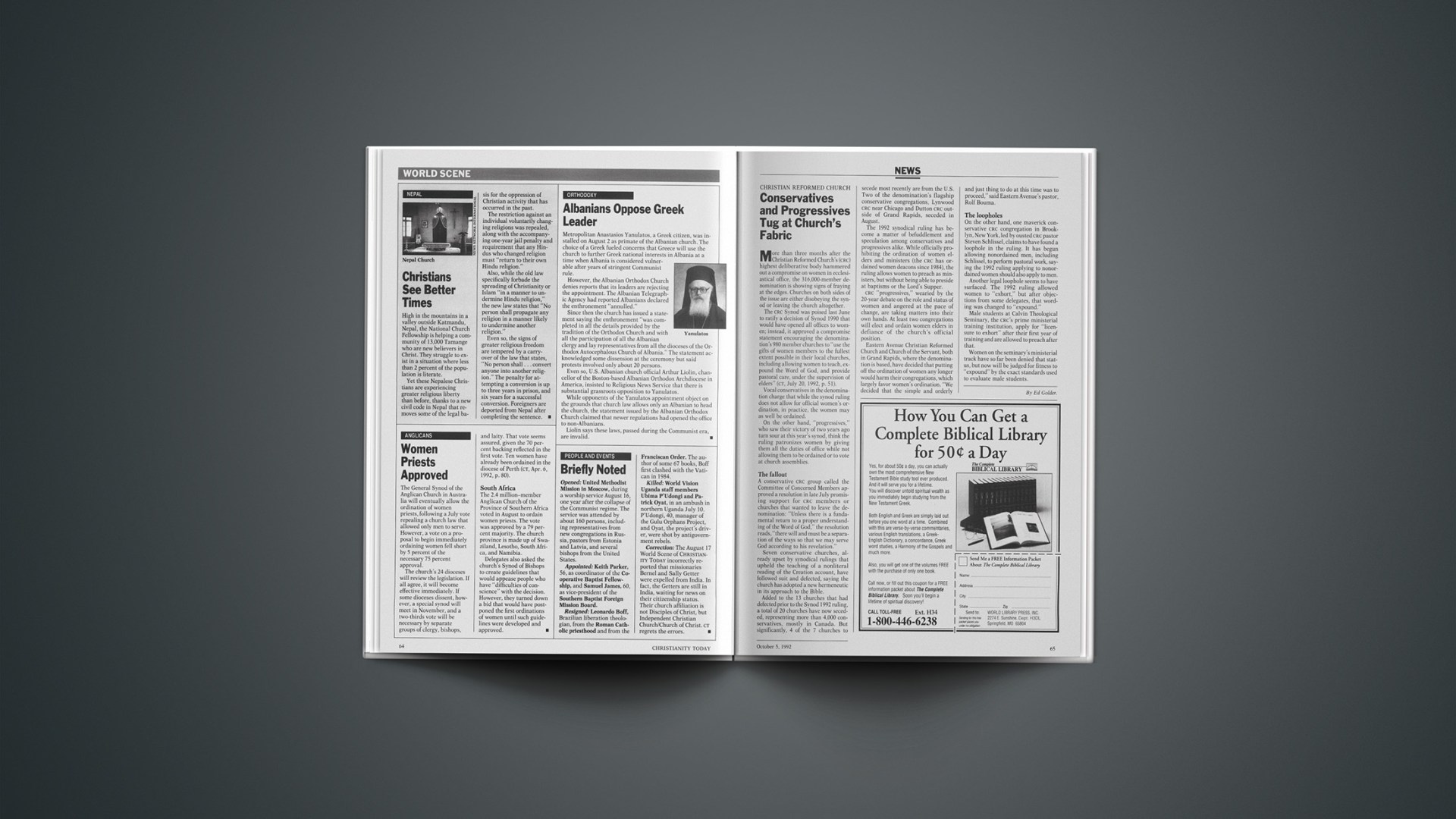Nepal
Christians See Better Times
High in the mountains in a valley outside Katmandu, Nepal, the National Church Fellowship is helping a community of 13,000 Tamange who are new believers in Christ. They struggle to exist in a situation where less than 2 percent of the population is literate.
Yet these Nepalese Christians are experiencing greater religious liberty than before, thanks to a new civil code in Nepal that removes some of the legal basis for the oppression of Christian activity that has occurred in the past.
The restriction against an individual voluntarily changing religions was repealed, along with the accompanying one-year jail penalty and requirement that any Hindus who changed religion must “return to their own Hindu religion.”
Also, while the old law specifically forbade the spreading of Christianity or Islam “in a manner to undermine Hindu religion,” the new law states that “No person shall propagate any religion in a manner likely to undermine another religion.”
Even so, the signs of greater religious freedom are tempered by a carryover of the law that states, “No person shall … convert anyone into another religion.” The penalty for attempting a conversion is up to three years in prison, and six years for a successful conversion. Foreigners are deported from Nepal after completing the sentence.
Anglicans
Women Priests Approved
The General Synod of the Anglican Church in Australia will eventually allow the ordination of women priests, following a July vote repealing a church law that allowed only men to serve. However, a vote on a proposal to begin immediately ordaining women fell short by 5 percent of the necessary 75 percent approval.
The church’s 24 dioceses will review the legislation. If all agree, it will become effective immediately. If some dioceses dissent, however, a special synod will meet in November, and a two-thirds vote will be necessary by separate groups of clergy, bishops, and laity. That vote seems assured, given the 70 percent backing reflected in the first vote. Ten women have already been ordained in the diocese of Perth (CT, Apr. 6, 1992, p. 80).
South Africa
The 2.4 million-member Anglican Church of the Province of Southern Africa voted in August to ordain women priests. The vote was approved by a 79 percent majority. The church province is made up of Swaziland, Lesotho, South Africa, and Namibia.
Delegates also asked the church’s Synod of Bishops to create guidelines that would appease people who have “difficulties of conscience” with the decision. However, they turned down a bid that would have postponed the first ordinations of women until such guidelines were developed and approved.
Orthodoxy
Albanians Oppose Greek Leader
Metropolitan Anastasios Yanulatos, a Greek citizen, was installed on August 2 as primate of the Albanian church. The choice of a Greek fueled concerns that Greece will use the church to further Greek national interests in Albania at a time when Albania is considered vulnerable after years of stringent Communist rule.
However, the Albanian Orthodox Church denies reports that its leaders are rejecting the appointment. The Albanian Telegraphic Agency had reported Albanians declared the enthronement “annulled.”
Since then the church has issued a statement saying the enthronement “was completed in all the details provided by the tradition of the Orthodox Church and with all the participation of all the Albanian clergy and lay representatives from all the dioceses of the Orthodox Autocephalous Church of Albania.” The statement acknowledged some dissension at the ceremony but said protests involved only about 20 persons.
Even so, U.S. Albanian church official Arthur Liolin, chancellor of the Boston-based Albanian Orthodox Archdiocese in America, insisted to Religious News Service that there is substantial grassroots opposition to Yanulatos.
While opponents of the Yanulatos appointment object on the grounds that church law allows only an Albanian to head the church, the statement issued by the Albanian Orthodox Church claimed that newer regulations had opened the office to non-Albanians.
Liolin says these laws, passed during the Communist era, are invalid.
People And Events
Briefly Noted
Opened: United Methodist Mission in Moscow, during a worship service August 16, one year after the collapse of the Communist regime. The service was attended by about 160 persons, including representatives from new congregations in Russia, pastors from Estonia and Latvia, and several bishops from the United States.
Appointed: Keith Parker, 56, as coordinator of the Cooperative Baptist Fellowship, and Samuel James, 60, as vice-president of the Southern Baptist Foreign Mission Board.
Resigned: Leonardo Boff, Brazilian liberation theologian, from the Roman Catholic priesthood and from the Franciscan Order. The author of some 67 books, Boff first clashed with the Vatican in 1984.
Killed: World Vision Uganda staff members Ubima P’Udongi and Patrick Oyat, in an ambush in northern Uganda July 10. P’Udongi, 40, manager of the Gulu Orphans Project, and Oyat, the project’s driver, were shot by antigovemment rebels.
Correction: The August 17 World Scene of CHRISTIANITY TODAY incorrectly reported that missionaries Bemel and Sally Getter were expelled from India. In fact, the Getters are still in India, waiting for news on their citizenship status. Their church affiliation is not Disciples of Christ, but Independent Christian Church/Church of Christ, CT regrets the errors.










